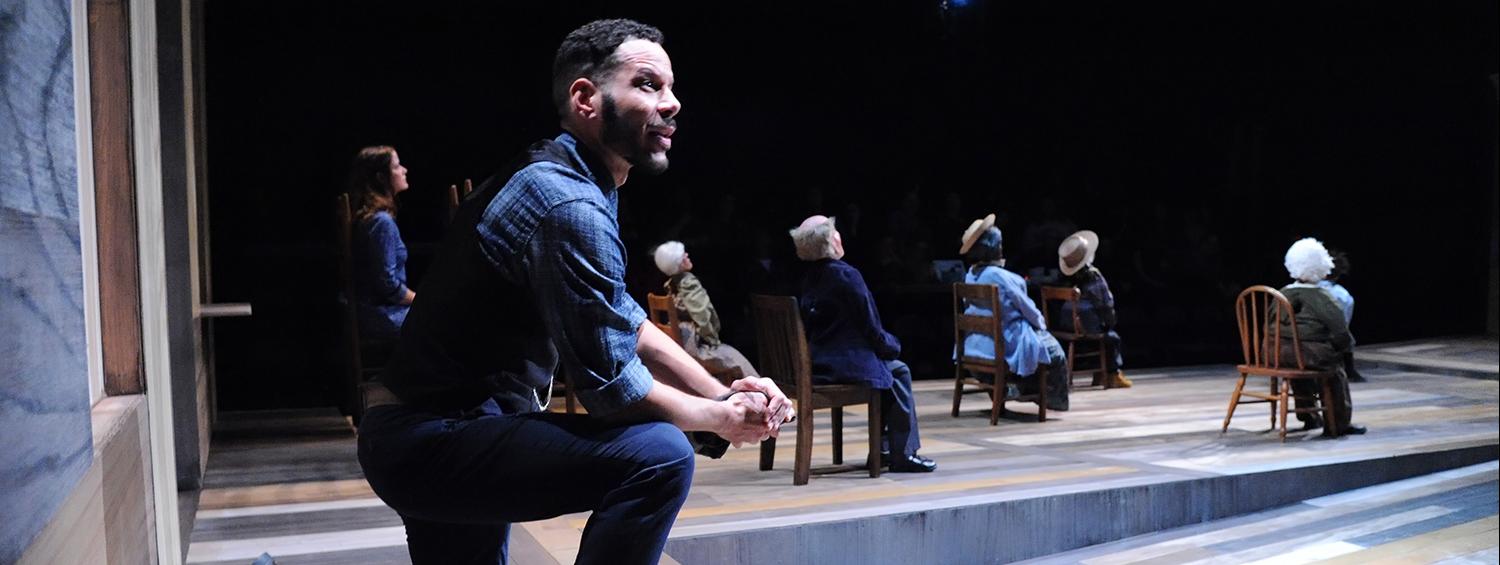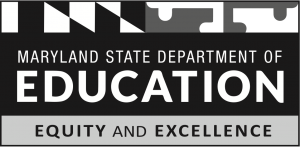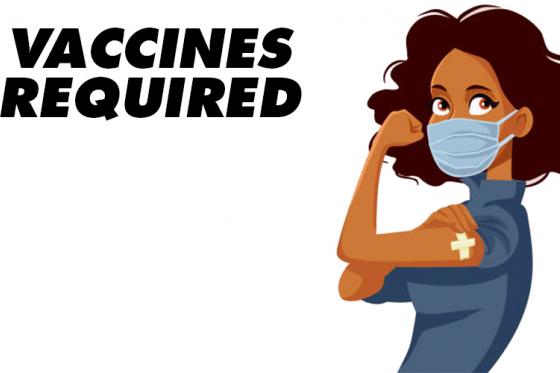MISSION
Olney Theatre Center for the Arts produces and curates theatrical performance for the diverse audiences in our community, and educates, learns from, supports and inspires a more inclusive generation of theater-makers.
VISION
We strive to become an arts and culture powerhouse, redefining the American regional theater movement by cultivating and sharing the creativity of our community.
VALUES
WE BELIEVE IMPACTFUL AND AUTHENTIC ARTISTRY SIMULTANEOUSLY PURSUES AESTHETIC INNOVATION, ENTERTAINMENT, TRANSCENDENCE AND SOCIAL JUSTICE.
- We believe inclusion is necessary to a full understanding of our shared humanity.
- We see artistic value at every step along a continuum that includes entertainment, education, and social change.
- We believe there can be artistic value at every step along a continuum that includes community creators and trained professionals.
- We believe challenging ourselves is essential to provide our artists and audiences with the most impactful experience.
- We believe artistic risk leads to personal growth for our staff, for our artists, our students and for our patrons.
- We demand artistic rigor in every work we produce and curate.
WE BELIEVE OUR THEATER AND OUR COMMUNITY ARE MADE STRONGER BY OUR UNWAVERING COMMITMENT TO ANTI-RACISM, EQUITY, DIVERSITY, INCLUSION AND ACCESS.
- We believe our theater should serve as a model for justice and fairness by providing equitable access and opportunity to every individual.
- We believe successful artistry requires participation from a diversity of individuals and a diversity of thought.
- Pursuing these values requires a collaborative, ongoing process of reflection, training, and application on both an individual and institutional level.
- Our commitment to this value is demonstrated by every step we take to ensure our institution reflects our community – staff, Board, makers, audience, and the stories we tell. See our full Anti-Racist Statement here.
WE BELIEVE OLNEY THEATRE CENTER SHOULD MATTER TO EVERYONE IN OUR COMMUNITY.
- We believe theater-makers are community builders.
- We believe our community is made of multiple audiences, and that each of those audiences deserves impactful and authentic performance.
- We believe good artistry enlivens its community by encouraging creative professionals to live and work there.
- We believe great theater contributes to civic vitality and a healthy economic environment.
- We believe in serving as responsible stewards of the property and legacy entrusted to us by our community, which includes recognizing the unceded land on which we are built.
WE BELIEVE A STRONG AND SAFE INSTITUTION ENABLES ARTISTIC RISK.
- We demand that all participants in the theater’s activities are treated with respect, and are allowed to work in a safe and supportive environment.
- We believe a strong institution requires fiscal responsibility, strategy in planning, and diligence in execution in every department and with every constituency.
- We believe that fostering creative thinking among our Board, staff and artists leads to innovation.
- We believe every department of a strong arts institution nurtures and cares for its artists, providing them with an essential foundation for growth.
- We believe science dictates the essential public health measures we take to protect our artists, staff and audiences.
WE BELIEVE ARTS EDUCATION PLAYS AN ESSENTIAL ROLE IN OUR NATION’S CULTURAL HEALTH.
- We believe education and artistry are intertwined.
- We believe in modeling professionalism as we practice it.
- We believe the artistic experience must be contextualized for its audience and its makers.
- We believe the field progresses via mentorship.
- We believe that providing the tools for artistic creation and collaboration to learners of all ages inspires innovation.
- We believe we have a responsibility to foster our audiences’ appreciation of a variety of artistic experiences.
WE BELIEVE THE ESSENCE OF GOOD ARTISTRY IS COLLABORATION.
- Collaboration and partnership are hallmarks of both our work onstage and the way we work offstage.
- Transparency in all facets of management encourages strong collaboration and risk-taking.
- We believe participation in the arts – as creators, as audiences, and as students - teaches collaboration, the importance of a nuanced view of the world, and self-reliance.
- We believe strong leadership shares its artistic and administrative decision-making processes with committed co-creators who share our values.
A Note on Community:
*While Olney itself (population 33,000) is 70% white, we sit near the heart of the State’s most populous County, Montgomery, which is majority-minority. For demographic purposes, when we consider who makes up our geographic community, we consider a ten-mile radius from the theater, which includes highly-diverse population centers Gaithersburg, Rockville, and Wheaton. Our diversity goals are to match the demographics of that population, which is approximately 51% BIPOC.
GLOSSARY
Access: Remove barriers to participation.
By prioritizing access, we commit to investing time and resources to limit or remove barriers to OTC.
Administrative Control: The act of making management and operational decisions such as establishing marketing budgets, making staff hires, and employee policies.
Artistic Control: The act of making decisions related to such areas as season production and program selection, and casting and director hires.
Artistic Risk: Take a chance artistically that might not have financial benefit.
Aesthetic Innovation: Explore, and perhaps push past, the edges of known artistic expression and practice.
American Regional Theatre Movement: Beginning in the 1960s theatres around the country began to value the infusion of theatre-making and creativity into their communities. These theatres produced their own seasons, and were most often located outside the main theatrical hubs.
In this document, OTC commits to enhancing its work by taking inspiration from its community.
Anti-Racism: A belief or practice that recognizes pervasive racism in society, and actively combats racial prejudice and discrimination in order to promote racial justice and equality. It establishes a higher bar than merely being non-racist, and requires intentional actions to dismantle racism.
Artistic and Administrative Decision-Making Process: The actions related to approving key components of production and management, including but not limited to marketing budgets, creative team choices, title selection, schedules, fundraising events.
Authentic: Derived from real, lived experience; from a true and honest place, not forced or “put on.”
Civic Vitality: The energy created by the complex and rewarding relationship between people and their surrounding environment, including their government.
Curates: The act of identifying, organizing and selecting the artistic elements of a program.
Our Community / Communities: For the purpose of this document, our community is comprised of those people living within 10 miles of OTC’s campus. (See attached diagram.)
While we recognize that we also serve many communities in Maryland, Metropolitan Washington, DC and throughout the country, this document serves to identify goals and plans for expanding our theatre’s reach and impact within our nearby community.
Community Curators: Artistic visionaries hired by OTC to create work that reflects and connects with specific cultural or regional communities.
Contextualize: To put in context; to provide explanation and deepen understanding of an idea or story.
Culture Creators / Community Builders: Individuals who inspire new ways of creative expression and in doing so strengthen community.
Diverse: Differing from one another; a variety.
A diverse room will be comprised of people of different genders, sexual orientation, ages, races, cultures, religion and socio-economic backgrounds.
A diverse theatre season will include a mix of stories from musicals to plays and new work to traditional.
Diversity: Comprised of a variety of many elements; differing ideas or perspectives.
Enlightenment: To impart knowledge and understanding.
Entertainment: To bring pleasure, diversion, amusement, or enlightenment from performance.
Equitable Access: To enable all people to have the same opportunity to participate in theatre.
Where there are differences, OTC commits to provide opportunities for equity.
Equitable: A system of reasonable and just fairness.
Equity: The quality of fairness; ensuring that all people are given equitable chances.
Equality ensures that all have the same, whereas equity ensures that all have an equal chance at the same goal.
Impactful: A lasting effect, often leading to positive change.
Inclusive: To not exclude any person or group; to avoid bias and discrimination.
OTC commits to ensuring that those who have been traditionally excluded from our institution are meaningful and equitable participants in our theatre-making and community-building.
Inclusion: The practice or policy of providing equal access to opportunities and resources for people who might otherwise be excluded or marginalized.
Mentorship: The act of providing guidance, teaching and modeling.
OTC is committed to mentorship in order to ensure the future of this theatre and our field.
Our institution reflects our community: Our commitment that the demographics of our staff, artists and apprentices mirror the demographics of the 10-mile radius around OTC.
Powerhouse: An organization that is respected for its leadership and the influence it has on trends and positive change; making a clear impact, and establishing a model that others emulate.
Produces: Oversees all aspects of a production.
A producing theatre is responsible for all artistic, financial and managerial functions of a production or venue; raises or provides financial backing, and hires personnel for creative positions. These positions may include performers, writers, directors, designers, composers and/or choreographers.
Professionalism: The qualities of being expert, respectful and valued, as reflected in the OTC brand.
We use this term to emphasize the expectation that all people and projects manifest our commitment to providing an experience worthy of the time and attention of others.
Recognizing the unceded land: OTC commits to providing verbal and written statements that recognize our land’s history that began with the Piscataway Conoy tribe.
Rigor: The best possible effort; discipline, strength and focus.
Safe: Ensuring that conditions in the workplace are free of all forms of oppression, harassment and bullying; ensuring that conditions that keep the mental and physical wellbeing of employees are a top priority; maintaining an environment of shared understanding among all employees and volunteers of these conditions, and their shared responsibility for seeing them upheld.
Social justice: The practice of treating all people fairly, including respect for the rights of minorities and equitable distribution of resources among members of a community.
Theater-makers: All those who work, paid or volunteer, to create, produce, support, or otherwise participate in the act of making theatre for the stage.
Transcendence: The experience of something beyond the normal or physical level; to understand beyond the ordinary.
Transparency in all facets of management: Openly share resources, materials and conversations to help inform decisions that affect the organization and/or individual projects.
For example, sharing operating budgets with all members of the staff.





